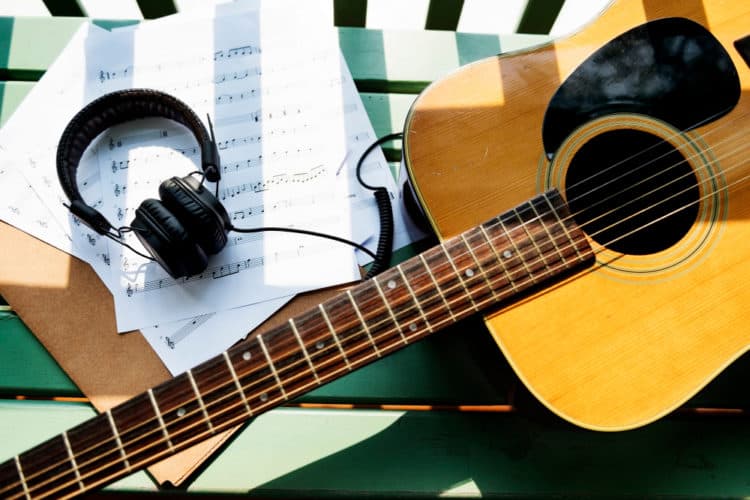If you’re new to music theory or new to guitar in general and you’ve just learned about transposing, you’re probably asking this question.
There are some limitations, but they’re mostly to do with understanding rather than strict rules, for the most part though:
Yes, as long as you know the progression of the notes and the chord patterns, you can play any song in any key. The only difference in key changes comes with inherent impressions on tonal color based on frequency and pitch.
While transposing can seem daunting at first, with a little practice, it is quite manageable and not a difficult thing to do.
It requires some background knowledge though and we’ll be looking at that today.
A quick recap on what’s the key of a song
A song’s key is the note or chord the music is centered around.
This is called the tonic of the key.
In classical notation, the key of a song is provided by its key signature on the stave. For example, the key of C has no sharps or flats, so it will look like this:
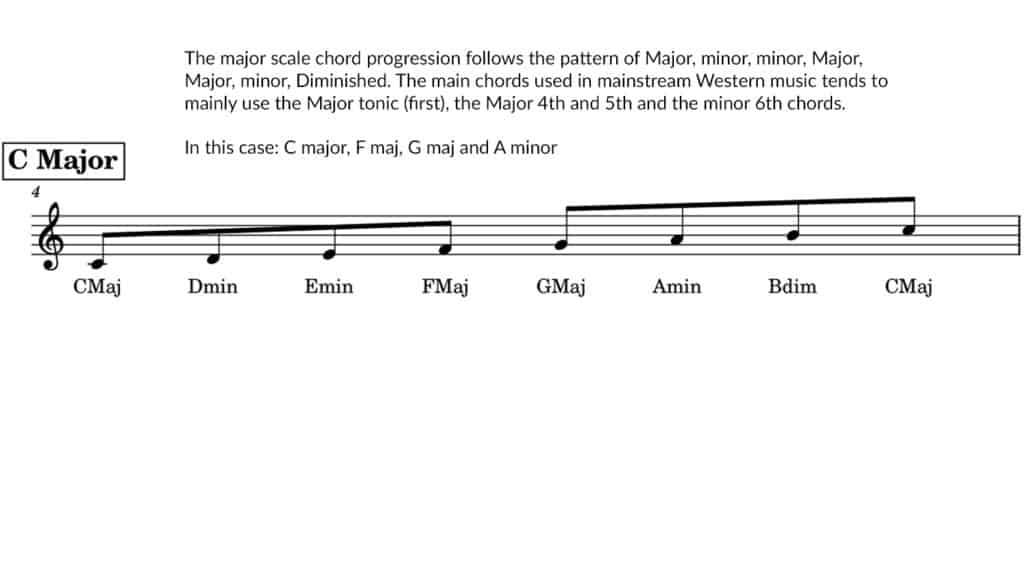
some keys have sharps due to the relationships between their notes, the simplest example is G major, with one sharp:
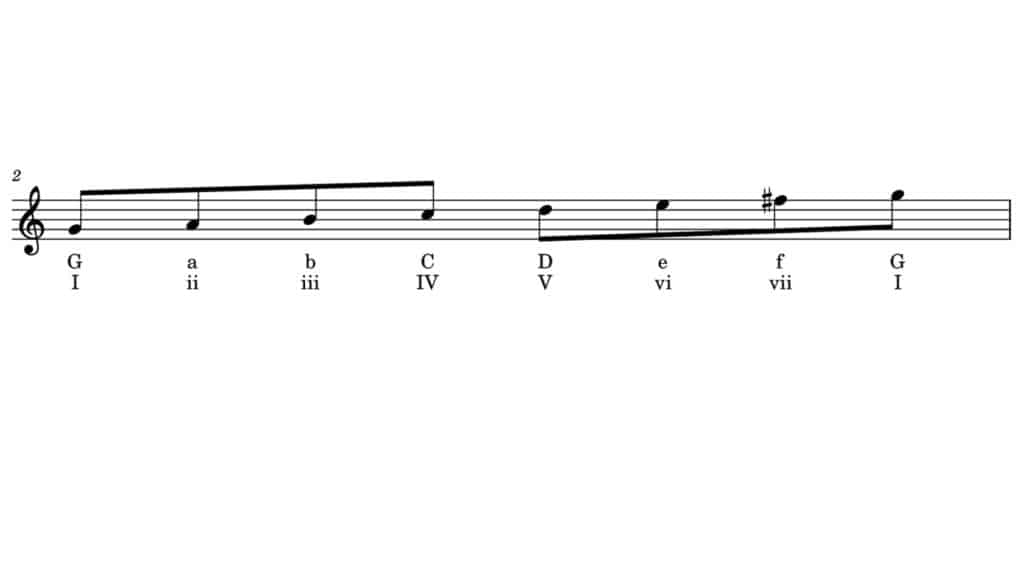
The reason why keys may have sharps in their scale is due to the relationships of the notes within the key. For example, major keys have a chord progression as such:
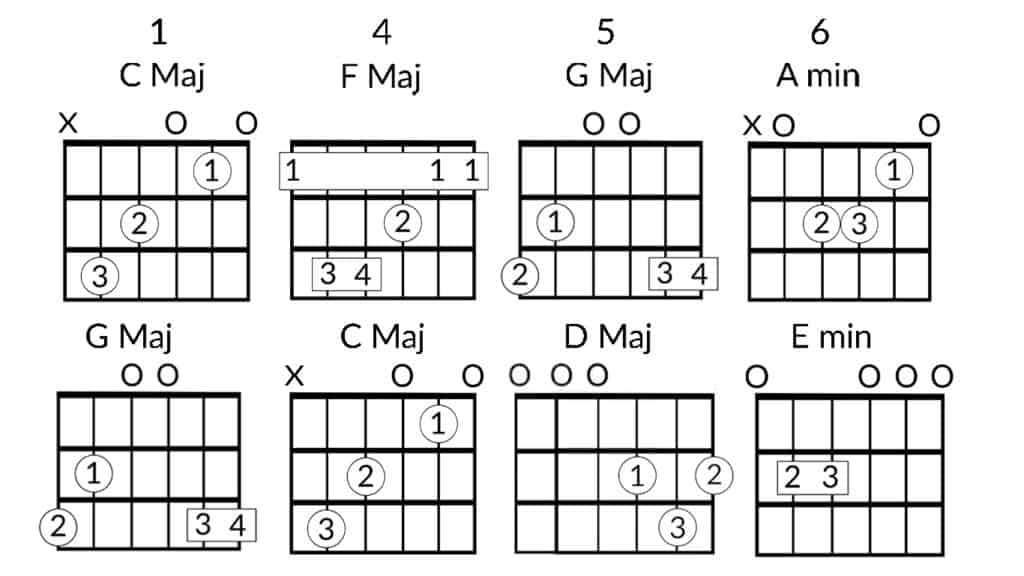
In essence, the pattern remains exactly the same, all that changes is the starting point and the pitch of the key. In that sense, D major and C major are only different in that D is one step higher in pitch than C.
We could go further and discuss modality in keys and different keys like minor and melodic major and harmonic and blues, but that’s a story for another day. The main thing you need to know is that if you’re playing a song in its given key and scale, then you can transpose to another key as long as you maintain the same scale.
How do you determine the key of a song if you don’t know it?
There are a few ways to determine a song’s key if you’re unsure and it’s not given.
If you know about chords, you can take a look at the main chord progressions. Most modern music is based on a four-chord progression, usually consisting of the first, fourth, fifth, and minor sixth chords.
For example, if you’re playing a song and the chords are C major, F major, G major, and A minor, you’re playing in C major.
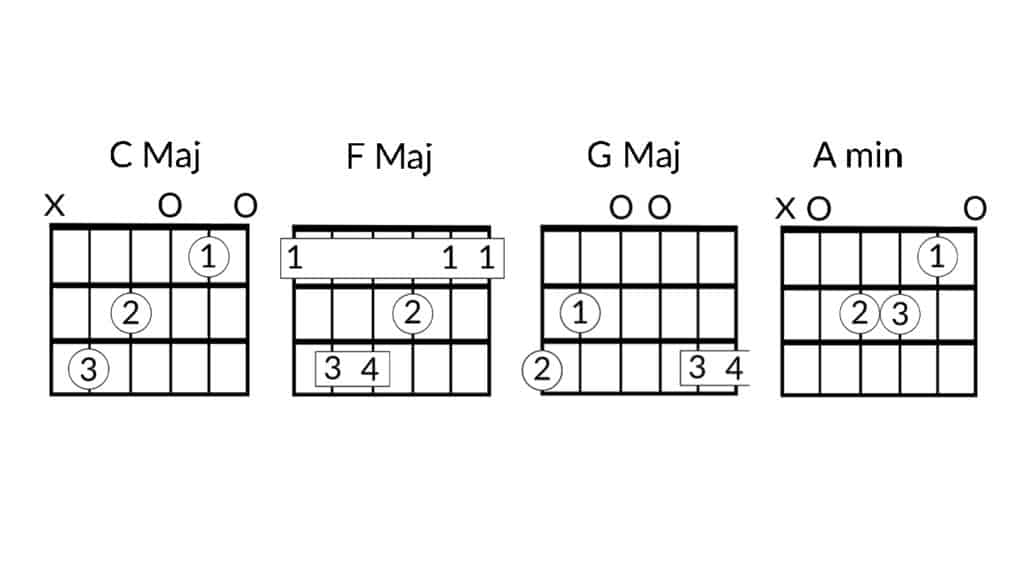
This may come forth in a few different patterns, but you can usually spot a song’s key by recognizing the first and sixth chords.
This can get a little trickier when the song breaks from its general mold by not including say the sixth, but rather starting on a minor second.
You can still figure out the key as long as you know three or four of the chords being played.
The only thing that might catch you out if you’re new to music theory is borrowed chords, but again, it’s usually only one here and there in modern, popular music.
Are songs intended to be played on a specific key on guitar?
Most of the time songs are played in keys based on preference and the familiarity of the guitar player with said key.
Some guitarists feel more comfortable playing in the key of A minor or E minor, while others prefer C major.
The second consideration in most modern music is the comfort of the singer and their ability to sing in a chosen key.
Some singers have certain keys that they resonate most with and prefer to sing in, but often when songs are covered, that can change from one singer to the next.
Changing the key of a song changes a little bit of how it feels.
Some theories suggest different keys have a different color to them, attributing a sort of synesthesia to each key, stating that D major for example feels brighter, while C major feels warmer.
I find the idea that songs are intended to be played in specific keys to be very rigid, and while there are people that believe this, I don’t agree.
I think that songs are up for interpretation from one individual to the next and while it may be perfectionistic to play the exact same key, if you’re more comfortable expressing the song in a different key, you should feel free to.
The only caveat here is that you maintain the integrity of the song if you’re doing a cover of it.
There’s a big difference between making the song your own and being too lazy to properly understand the song and its context within its melody.
Oftentimes guitar players will do this, calling it “being creative” and they usually wind up watering the song down and making it generic and bland. If you’re going to change the song up, respect its original message.
Can you transpose any song to any key?
Yes and no.
You can change any major key to any other major key and the same for minor keys.
As long as you’re only raising or lowering the pitch of a key toward another that shares its qualities and harmonic relationships between notes, you can transpose freely.
When it comes to playing melodies, the same can be done and it’s quite a fun experiment, but it takes a bit more know-how than just raising or lowering the pitch of the song.
This topic requires a lot more than a paragraph though, so we’ll be keeping it simple today.
Are there any limitations to transposing a song to another key?
I’d say the main limitation is your familiarity with music theory and how well you know chord patterns and scales.
You can transpose between major and minor, but that also requires changes in the way the song is played.
Some songs actually have this naturally as part of their musical arrangement.
What happens when you change C major to C minor for example?
For starters, it’s not just as simple as changing all the major chords to minor chords and vice versa, but rather you have to look at the chord pattern of each key and place the chords in that context.
Why are some keys favored over others in guitar songs?
Some genres like to lean into the color and feel that some keys give.
For example, minor keys are considered a lot darker than major and you’ll find a lot of metal songs are in E minor.
What it comes down to most of all are the keys that are inherently most complimentary to certain instruments.
Due to the materials and natural resonances of the materials that different instruments are made of, some keys tend to be favorable to them.
That aside and without getting too into the theoretical aspect of instrumental timbre and frequencies and resonances, there is also the point of preference and convenience.
For guitar players, some keys are more comfortable to play and in certain genres, lend well to open chord positions.
For example, the key of G and C are quite comfortable on guitar, whereas the key of F and B are a little less so unless you’re playing a lot of barre chords.
Either way, most guitar players will tell you that playing a B major bar chord at the top of the neck is a lot less comfortable than playing a C major open chord.
This factor of comfort tends to lend a lot to the keys played on guitar.
Should you learn songs in many different keys?
Yeah! There’s nothing wrong with improving your skill and experimenting with songs.
Music and music theory are all about discovering and exploring and while at one point in history, things were very rigid, music has become a lot more fluid today.
You will definitely find that modern music is very simplistic and the theoretical aspect of songs is very rarely complex, but that doesn’t mean you shouldn’t experiment as a musician.
The saying goes that a great artist steals from many other artists to make their unique style.
Of course, we’re just discussing the scope of transposing here, so maybe I shouldn’t get too carried away, but it’s in the same vein.
In short, learn to transpose, and learn to do it well, because it will only aid you as a musician and you might find yourself in a band that’s constantly wanting to change to their comfortable key.
I’ve been there, where every song is transposed to C major and I thank past me every day for spending some time on music theory.

Hello there, my name is Ramiro and I’ve been playing guitar for almost 20 years. I’m obsessed with everything gear-related and I thought it might be worth sharing it. From guitars, pedals, amps, and synths to studio gear and production tips, I hope you find what I post here useful, and I’ll try my best to keep it entertaining also.

